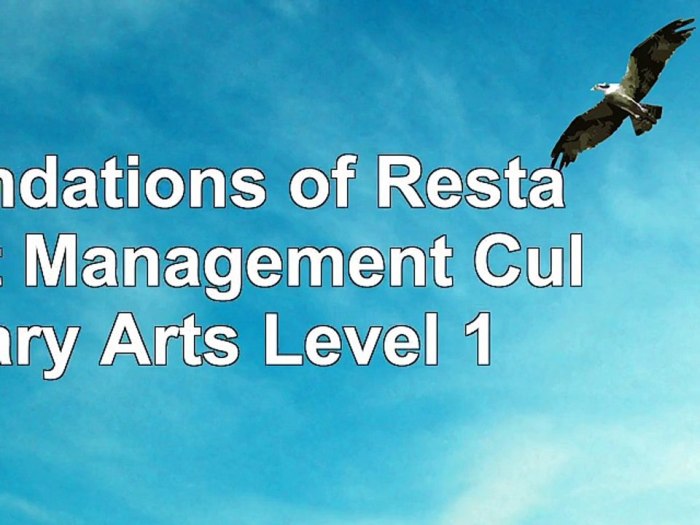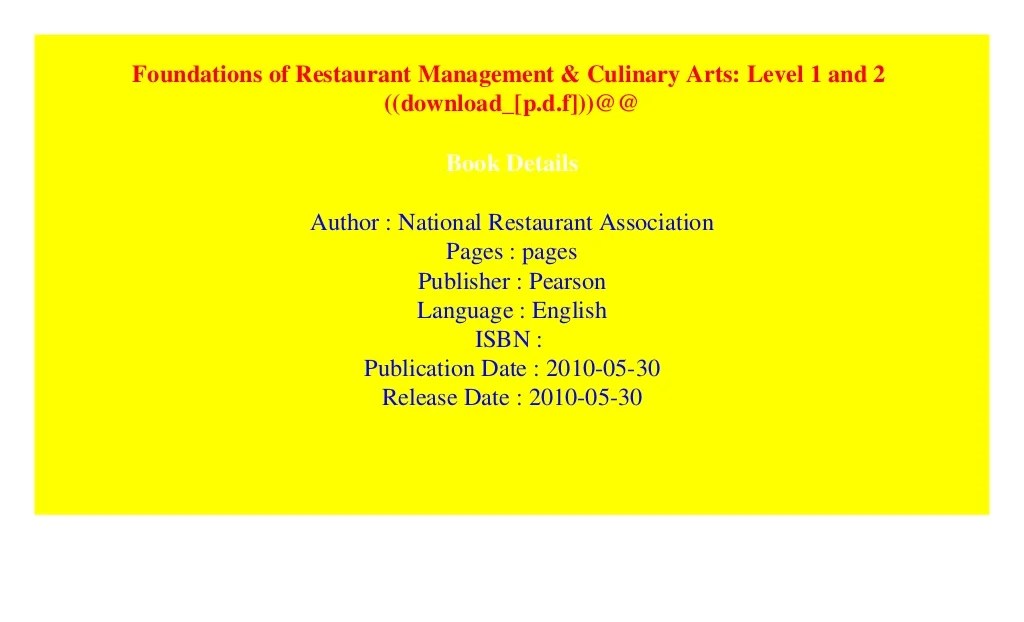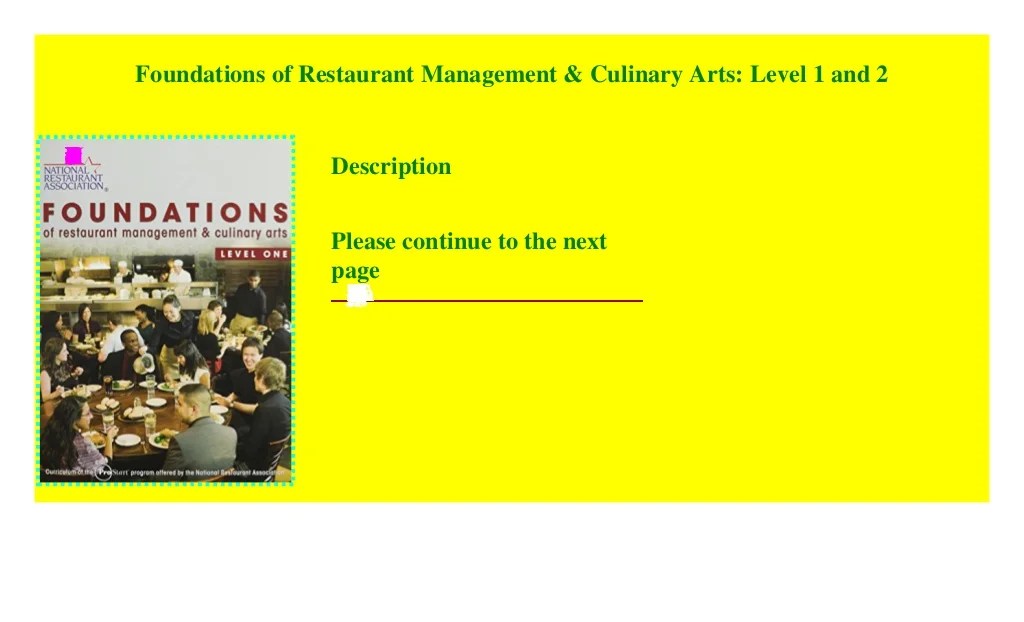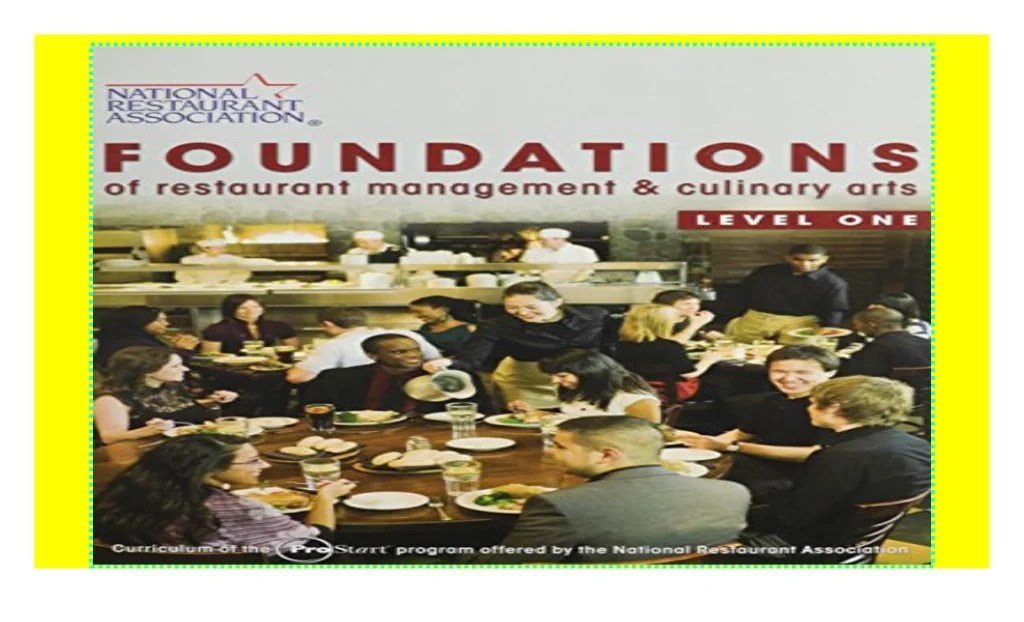Foundations of Restaurant Management and Culinary Arts Level 1 is a comprehensive guide that provides a solid foundation for aspiring professionals in the hospitality industry. This meticulously crafted program offers a deep dive into the principles and practices that underpin successful restaurant operations and culinary excellence.
Through engaging and informative content, this guide empowers learners with the knowledge and skills they need to navigate the dynamic world of restaurant management and culinary arts. It explores the intricacies of restaurant operations, from planning and staffing to customer service and financial management.
Additionally, it delves into the fundamentals of culinary arts, covering essential techniques, food safety, and menu planning.
Foundations of Restaurant Management: Foundations Of Restaurant Management And Culinary Arts Level 1

Restaurant management is the process of planning, organizing, staffing, directing, and controlling the operations of a restaurant. Effective restaurant managers must be able to communicate effectively with their staff and customers, and they must be able to work as part of a team.
They must also be aware of the legal and ethical responsibilities of their position.
Principles of Restaurant Management, Foundations of restaurant management and culinary arts level 1
- Planning: Developing a plan for the restaurant’s operations, including menus, staffing, and marketing.
- Organizing: Establishing the structure of the restaurant, including the roles and responsibilities of each employee.
- Staffing: Hiring, training, and motivating employees.
- Directing: Leading and motivating employees to achieve the restaurant’s goals.
- Controlling: Monitoring the restaurant’s operations and making adjustments as needed.
Principles of Culinary Arts

Culinary arts is the art of preparing and presenting food. Culinary artists must be able to use a variety of techniques, including knife skills, cooking methods, and food presentation. They must also be aware of the importance of food safety and sanitation.
Basic Techniques Used in Culinary Arts
- Knife skills: The ability to use a knife safely and efficiently.
- Cooking methods: The different methods used to cook food, such as grilling, roasting, and sautéing.
- Food presentation: The art of arranging food on a plate in an appealing way.
Restaurant Operations
Restaurant operations involve the day-to-day running of a restaurant. This includes taking and fulfilling customer orders, providing customer service, and maintaining the restaurant’s facilities.
Types of Restaurant Service
- Table service: Customers are seated at tables and served by waiters or waitresses.
- Counter service: Customers order and pay for their food at a counter and then take it to their own table.
- Fast casual: A hybrid of table service and counter service, where customers order and pay at a counter but are then served their food at a table.
Food and Beverage Management

Food and beverage management involves the management of the restaurant’s food and beverage inventory, as well as the pricing and preparation of food and beverages.
Types of Food and Beverage Products
- Food: The edible items that are served in the restaurant.
- Beverages: The non-alcoholic and alcoholic drinks that are served in the restaurant.
Restaurant Marketing and Sales

Restaurant marketing and sales involve the promotion of the restaurant to potential customers. This includes advertising, public relations, and sales promotions.
Principles of Restaurant Marketing
- Target market identification: Identifying the specific group of people that the restaurant is trying to reach.
- Advertising: Creating and placing ads in various media outlets.
- Promotion: Developing and implementing sales promotions to attract customers.
FAQs
What are the key principles of restaurant management?
The key principles of restaurant management include planning, organizing, staffing, directing, and controlling.
What is the importance of food safety in culinary arts?
Food safety is paramount in culinary arts as it ensures the health and well-being of customers by preventing foodborne illnesses.
What are the different types of restaurant service?
The different types of restaurant service include table service, counter service, and fast casual.